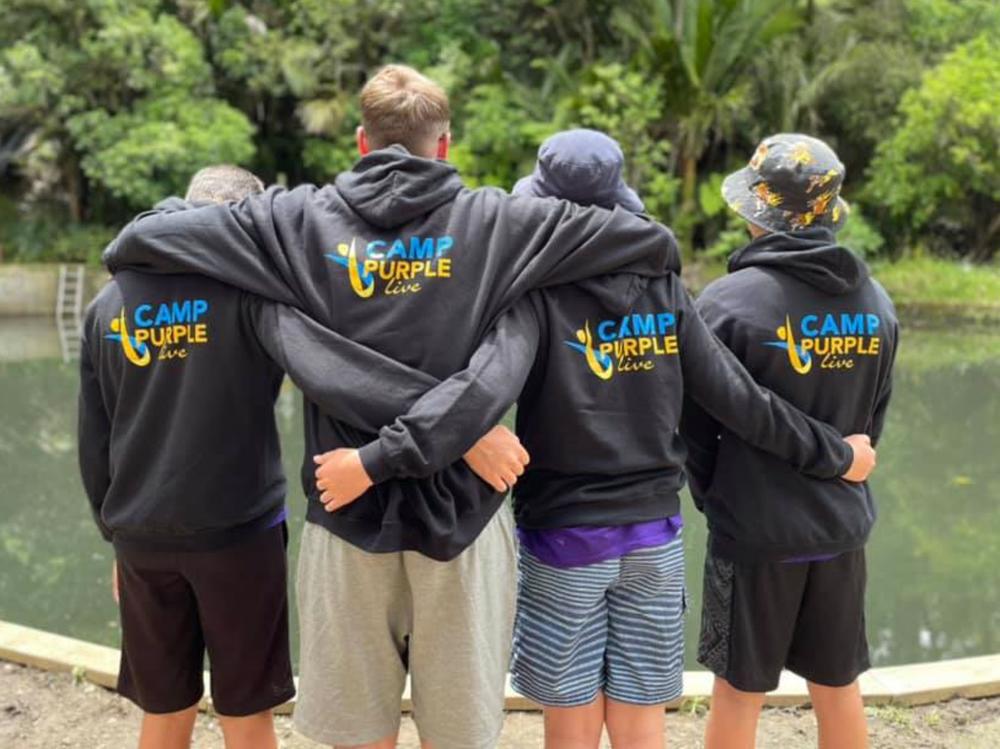Camp Purple Live 2024: A Lifeline for Kiwi Children and Teens Battling Crohn’s disease and ulcerative colitis–
Next Tuesday, 9 January, 71 children and teens and 25 young adult volunteers will be arriving at El Rancho in Waikanae
for a six-day camp on the Kapiti Coast.

This is no ordinary school camp. The children and volunteers all have inflammatory bowel disease (IBD), a term used to designate two chronic, incurable diseases: Crohn’s
disease and ulcerative colitis.
The annual camp was started in 2015 by Crohn’s and Colitis NZ Charitable Trust.
The camp, supported by a medical staff of five doctors, five nurses, and a child psychologist, is offered free, including transportation from all corners of the country.
New Zealand has one of the highest rates of these diseases in the world. They are diseases that often
require lengthy hospitalisations and repeated surgeries. They are treated with medications that suppress
the immune system to reduce the inflammation throughout the digestive system.
They are diseases that can be very isolating, particularly for young children.
Camp Purple Live provides a supportive environment where young individuals with these conditions can
gain insights into their illnesses, push personal boundaries, experience joy, and gain the tools to better
understand and manage their illnesses. Above all, the camp community shows them that they are not
alone.
At the heart of Camp Purple Live is an extraordinary team of volunteers, all of whom personally understand
the challenges of living with IBD. The volunteers play an important role in ensuring the safety, well-being,
and guidance of the campers.
The ten-member medical team ensures that medical issues are managed
promptly, and, importantly, that medications are properly administered. The camp’s child psychologist
facilitates and leads group discussions in a secure and protected environment.
The highlight of the camp is Carnival Day, when children who are too young to attend camp, can visit with
their families and experience the camp and community in a single day.
Carnival Day is a time when everyone dons costumes, navigates obstacle courses, and has the chance to dunk their leaders, the CEO, nd the medical team in a dunk tank.
Dr. Richard Stein, Chair of CCNZ, comments that “it is great that the
kids get to interact with the medical staff on a personal level. They see doctors and nurses as real people,
able to have fun, people who are genuinely concerned with their welfare”.
This year, CCNZ’s CEO, Belinda Brown, has taken up several embarrassing challenges to raise funds for next year’s camp. Belinda says that “if enough funds are raised, I’ve agreed to be dunked in the tank, be a willing target for water balloons, and swim in the lake with the eels!”
Camp Purple Live and Crohn’s and Colitis New Zealand Charitable Trust are funded solely through
charitable grants and personal donations.
For more information about Camp Purple Live 2024 or the Crohn’s and Colitis New Zealand Charitable Trust, please contact us (information below) and watch the video: https://youtu.be/uin88vOE7_s
To donate to the CEO’s challenges, please donate through our give-a-little page:
https://givealittle.co.nz/cause/camp-purple-live-2024-waikanae
ENDS
About Crohn’s disease and ulcerative colitis2:
- Crohn’s and ulcerative colitis are chronic, incurable, autoimmune diseases collectively known as
Inflammatory Bowel Disease (IBD). - Over 20,000 New Zealanders have IBD.
- New Zealand has the third highest IBD rate in the world.
- Most people are diagnosed in childhood, their teens or early adulthood, and suffer with these
illnesses their entire lives. Children in particular are impacted in their most formative years. - Symptoms are severe, urgent, bloody diarrhoea, bowel blockages, abdominal pain, perforated
intestines, and abscesses and inflammation in the anal area. - ‘Flares ’of the disease are common and frequently involve emergency hospitalisation, and repeated
irreversible surgeries to remove sections of the bowel. - Many patients are forced to live with a permanent ostomy (bag).
- IBD has an array of other symptoms including arthritis, diseases of the spine, the liver, diseases of
the eyes, skin lesions, and an increased risk of bowel cancer. - NZ has one of the highest per capita rates of IBD in the world, and it is growing at over 5% per year.
- IBD has profound physical, social and psychological impacts on those living with it, affecting their
education, social relationships, work lives, and their ability to have a family. - IBD costs NZ an estimated $245 million in healthcare costs and lost productivity.
Contacts;
Richard Stein, MD, FRACP, FACG
Chairman, Crohn’s and Colitis NZ Charitable Trust
027 545 4539
Belinda Brown
Chief Executive Officer
Crohn’s and Colitis NZ Charitable Trust
021 624 583

No Comments